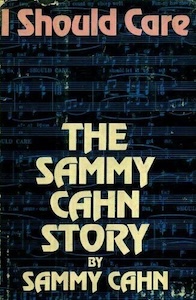
On The Bookshelf
I Should Care: The Sammy Cahn Story
I Should Care: The Sammy Cahn Story is an autobiography by the acclaimed lyricist Sammy Cahn. Published in 1974 by Arbor House, the book is written from Cahn’s own perspective, offering his insights into his life and career, along with anecdotes, photographs, and lyrics of his well-known songs.
The title itself is a nod to one of his famous songs, which first appeared in the 1944 MGM film Thrill of a Romance. The Academy Award winner for Three Coins In The Fountain, High Hopes, All The Way and Call Me Irresponsible, star performer in his own Broadway musical Words & Music.
This Lower East Side New York City boy who made more than good now tells his whole loving story – personal, public and professional.
I Should Care ~ The Sammy Cahn Story: 1974 | Sammy Cahn
Arbor House Publishing Co.
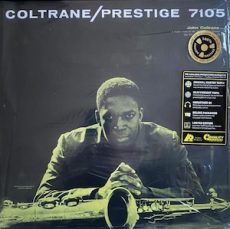
Requisites
Coltrane ~ John Coltrane | By Eddie Carter
As someone who has enjoyed John Coltrane’s music for years, I’ve revisited this morning’s album from the library countless times, and each time I listen, it reveals something fresh and exciting. Coltrane (Prestige PRLP 7105) is the first chapter in a body of work that continues to challenge, inspire, and uplift listeners. John Coltrane’s path to his debut album was anything but easy. He grappled with addiction and periods of self-doubt, which eventually led to his dismissal from Miles Davis’s quintet. After returning to Philadelphia to end his addiction, John overcame his dependencies and embarked on a profound spiritual journey, allowing him to discover his singular musical voice and ultimately his first Prestige recording session.
Joining the tenor saxophonist are Johnnie Splawn on trumpet (tracks: A1, B1 to B3), Sahib Shihab on baritone sax (A1, B1, B3), Red Garland (A1 to A3), and Mal Waldron (B1 to B3) on piano, Paul Chambers on bass, and Albert “Tootie” Heath on drums. My copy of this album is the 2023 Analogue Productions mono audiophile reissue, sharing the original catalog number. “Bakai” by Cal Massey opens the first side, unveiling the ensemble’s relaxing melody. Red initiates the solos with a gentle and lyrical touch, as smooth as a calm sea. John’s following statement is grounded in a steady, unwavering rhythm of harmonic exploration. Sahib then steps in with an exquisite statement that nearly steals the show, leading back to the sextet’s theme restatement and ending.
Violets For Your Furs is a charming ballad from the 1940s by Tom Adair and Matt Dennis, which Red brings to life with a tender introduction to Coltrane’s lyrical sensitivity in the quartet’s theme, and a softer, more romantic side in the opening solo. Garland comes in next for a thoughtful, reflective reading until Coltrane gracefully reenters for the theme’s elegant climax. “Time Was” by Gabriel Luna de la Fuente, Paz Miguel Prado, and Bob Russell moves the beat upward for the quartet to give a lively melody. John leads off the solos with an abundance of passion, then Red continues soaring with joyful exuberance in the second reading. Paul has the last word and takes a short walk ahead of the theme’s return and finish.
Straight Street by John Coltrane gets the second side off to a good start. This song announces the spiritual dimension that would become central to his later albums. The sextet returns to full voice for a swinging melody with Mal taking over the piano duties. Coltrane gets right to work and wails on the opening statement. Splawn steps in next, firing on all cylinders, then Waldron takes the final spotlight preceding the group’s return for a vivacious exit. The pace slows down again for the album’s second 1940s ballad, “While My Lady Sleeps,” by Gus Kahn and Bronislaw Kaper. The ensemble presents a splendid study in soulful improvisation, with John paving the way through the melody into an affectionately intimate reading that ends as beautiful as it began.
Chronic Blues by John Coltrane opens with the sextet easing into the theme at a laid-back, comfortable tempo. Shihab launches the opening solo with rhythmic grace and effortless flow. Coltrane next delivers a smooth and inviting swing, as warm and familiar as a favorite homemade dish. Splawn’s turn brings a light and airy touch, infusing the piece with an appealing charm. Waldron closes things out with a breezy reading that leaves the sextet’s finale deeply satisfying. Bob Weinstock supervised the initial session, and Rudy Van Gelder was behind the recording dials. Kevin Gray mastered this audiophile reissue at Cohearant Audio. The album’s sound quality is spectacular, with a gorgeous soundstage that places the musicians directly in front of your sweet spot.
The record was pressed on 180-gram audiophile vinyl and offers an absolutely silent background until the music unfolds. Upon its release, “Coltrane” was met with excitement from jazz lovers and critics alike, though it didn’t propel John Coltrane to instant fame. That recognition would eventually arrive with “Giant Steps,” “My Favorite Things,” and “A Love Supreme.” Still, his debut firmly established Coltrane as a bandleader, composer, and innovator. It also marked the beginning of an extraordinary journey, where he would push the boundaries of jazz, explore spiritual themes, and redefine musical expression. If you haven’t experienced “Coltrane” yet, I highly recommend searching for it on your next record store visit. It’s an outstanding album by John Coltrane that provides a calming, immersive listening experience, gently enveloping you in its soothing melodies from the very first note!
A Love Supreme (Impulse A-77/AS-77), Giant Steps (Atlantic 1311/SD 1311), My Favorite Things (Atlantic 1361/SD
1361) – Source: Discogs.com Violets For Your Furs, While My Lady Sleeps – Source: Wikipedia.org © 2025 by Edward Thomas CarterMore Posts: choice,classic,collectible,collector,history,instrumental,jazz,music,saxophone
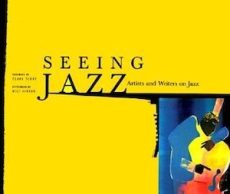
On The Bookshelf
Seeing Jazz: Artists & Writers On Jazz
Within these 144 pages, Seeing Jazz is a showcase of 77 paintings, sculptures, drawings, collages, and photographs, accompanied by literary selections, that express the many moods of jazz. This is jazz, art, and literature in concert.
In this museum of artists are, but not limited to, include Romare Bearden, Sam Gilliam, James Phillips, Miles Davis, Gjon Mili, Jacob Lawrence, Stuart Davis, Ann Tanksley, Archibald Motley, Ed Love, Gordon Parks, JeanMichel Basquiat, Henri Matisse, William Claxton, Stuart Davis, Ed Love, and Man Ray,
A representation of authors include Julio Cortazar, Ntozake Shange, Ralph Ellison, and Toni Morrison. The Foreword was written by trumpeter Calrk Terry, the Afterword by bassist Milt Hinton. The introduction is by Columbia University jazz scholar Robert O’Meally.
Whether it is improvisation, spontaneity, fusion, freedom or innovation, jazz has always been about more than music, and the ideas and moods of jazz have ruffled the minds of creatives throughout every category of the arts.
Seeing Jazz: 1997 | Marquette Folley-Cooper, Deborah Macanic, Janice McNeil
Chronicle Books | Smithsonian Institution Traveling Exhibition Service
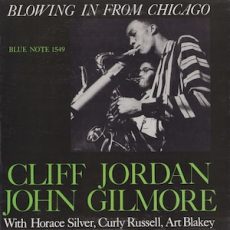
Resquisites
Blowing In From Chicago ~ Cliff Jordan & John Gilmore | By Eddie Carter
As a youngster discovering this music, I was always captivated by jazz’s unique and spontaneous nature, particularly the ‘blowing session’ or ‘jam session.’ These impromptu performances, where musicians control the flow of musical ideas from moment to moment, are a testament to the music’s excitement and unpredictability. Whether in a live setting at a club, concert, or jazz festival or captured in a studio session, jazz’s enthusiasm, vitality, and freedom are always present.
This morning’s choice from my library is an excellent LP from 1957 by two tenor saxophonists who made significant impressions in jazz, Clifford Jordan and John Gilmore. Their only album as co-leaders is titled Blowing In From Chicago (Blue Note BLP 1549), which signifies their roots in the vibrant jazz scene of Chicago. The quintet has an excellent rhythm section consisting of Horace Silver on piano, Curly Russell on bass, and Art Blakey on drums. My copy is the 1983 Pathé Marconi-EMI French Mono reissue, sharing the original catalog number. Before I proceed, let me state that this is not a DMM (Digital Metal Mastering) pressing.
The album opener, Status Quo, is a lively tune by John Neely, with both horns leading the charge through the uptempo melody. John rips into the opening solo, aggressively slicing through each verse like a sharp blade. Clifford joins him next in a short exchange, then takes off with a supercharged reading. Horace shifts into high gear on the third statement with a blazing swiftness that’s equally inspired and scintillating. Art engages in a brief conversation with both horns, then brings the solos to a close with an electric performance illustrating his incomparable artistry before the ensemble returns to the theme and quick stop. The first of two originals by Jordan follows.
Bo-Till slows the tempo to a laid-back pace with a Latin flavor. After a short introduction by the trio, the quintet states the theme collectively, stepping aside for Jordan, who makes a profound impression with a beautifully conceived statement displaying a great tone throughout. Silver gets into the groove next with an incredible, smooth reading, one of his best on the album. Gilmore delivers the closing choruses of the song proficiently with meticulous execution. Blakey constructs a concise comment during the ensemble’s end theme and close.
Blue Lights by Gigi Gryce is a catchy tune that opens with the quintet laying down a gorgeous medium beat on the theme and gives everyone a solo opportunity. John steps into the spotlight with a spirited performance. Horace follows with notes of undeniable pleasure in one of his most robust solos. Clifford weaves his way through the next musical improvisation with astounding skill. Curly puts together a condensed reading that walks for one chorus with solid bass lines. Art breezes into a straightforward interpretation that culminates into a splendid summation of the first side.
The second side gets underway with Charlie Parker’s Billie’s Bounce, which gives everyone except Russell a lengthy solo canvas on which to work. Blakey begins with a high-voltage introduction that sets the pace for the following fiery quintet theme. Clifford packs a mighty punch on the opening statement with a fire-breathing showcase, preceding John, who exhibits a robust attack on the subsequent interpretation with extremely hot choruses. Horace takes over next for a scintillating performance, taking his piano on a sizzling uptempo ride. Both horns exchange a few riffs with Art before the drummer gives an unaccompanied propulsive exhibition into the ending theme.
Clifford’s second original is a blues titled Evil Eye, which eases the throttle back from the previous burner to a medium pace with a collective melody by the quintet. Jordan opens the solos with a series of choruses that are smooth and well-structured. In the following presentation, Gilmore shows that he can also interpret blues with plenty of soul, which develops nicely. Silver delivers a lightly swinging performance that expresses pleasure as he moves masterfully through each chorus. Both horns return to share a few more thoughts. Blakey makes a short statement preceding the theme’s reprise and finish.
The album’s final track is Everywhere, a mid-tempo original by Horace Silver, which I believe made its debut on this album. It opens with a simple opening melody by the ensemble in unison, and the solo order is Gilmore, Jordan, Silver, and Blakey. John takes the stage first with a bewitchingly delightful opening statement. Clifford makes his case with a captivating contribution that moves sprightly alongside the rhythm section’s groundwork drive. Horace takes over next, communicating his points well with a pronounced beat. Art puts the joyous exclamation point on the song and album with a compelling statement that leads the group back to the ending theme and close.
Clifford Jordan recorded three albums for Blue Note; the other two LPs are Cliff Jordan and Cliff Craft. He played and recorded with many elite jazz musicians, including Charles Mingus and Max Roach. Clifford also enjoyed success recording as a leader and sideman, and in my opinion, his discography is well worth investigating. He remained in demand over the next three decades and toured worldwide. His final album was a 1992 live recording at Condon’s in New York City for Milestone, where he performed with his big band, Down Through The Years. He lost his battle against lung cancer on March 27, 1993, at age sixty-one.
Blowing In From Chicago was the first of three appearances on Blue Note by John Gilmore. The other two were as a sideman on two of Andrew Hill’s LPs, Andrew and Compulsion. He began playing the clarinet at fourteen, then pursued a musical career after a four-year stint in the United States Air Force, where he took up and played the tenor saxophone. He began a forty-year term with Sun Ra in 1953 and recorded for various labels with his group, Sun Ra Arkestra. During this time, Gilmore also toured with The Jazz Messengers and recorded with Paul Bley, Andrew Hill, Pete LaRoca, McCoy Tyner, and Dizzy Reece. After Sun Ra’s death on May 30, 1993, Gilmore led the Arkestra for two years before his death from emphysema on August 20, 1995, at age sixty-three.
As for the music on Blowing In From Chicago, it’s fantastic, as are the solos on each track, and the sound quality of this reissue is exemplary. The instruments deliver an excellent soundstage throughout the treble, midrange, and bass that places your sweet spot in the studio with the musicians. It’s a cut above the average debut album and a title I recommend as a terrific addition to any jazzophile’s library, particularly if you’re a hard-bop fan or love a good “blowing session” or “jam session.”
~ Andrew (Blue Note BLP 4203/BST 84203), Cliff Jordan (Blue Note BLP 1565), Cliff Craft (Blue Note BLP 1582/BST 81582), Compulsion (Blue Note BLP 4217/BST 84217), Down Through The Years (Milestone MCD-9197-2) – Source: Discogs.com
~ Billie’s Bounce – Source: JazzStandards.com
~ John Gilmore, Andrew Hill, Clifford Jordan – Source: Wikipedia.org
© 2024 by Edward Thomas Carter
More Posts: bandleader,choice,classic,collectible,collector,history,instrumental,jazz,music,saxophone
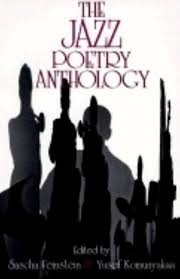
On The Bookshelf
The Jazz Poetry Anthology
Since the turn of the century, poets have responded to jazz in all its musical and cultural overtones. The poems here cover the range of jazz itself: from early blues to free jazz and experimental music. Among the 132 poets included are James Baldwin, Lawrence Ferlinghetti, Langston Hughes, Jack Kerouac, Mina Loy, Ishmael Reed, Sonia Sanchez, Amiri Baraka, Carol Bergé, Sterling A. Brown, Alice Fulton, and Carl Sandburg.
The poems give the reader a sense of jazz imagery through the history of the music, yet have been lost to so many jazz enthusiasts and aficionados of the 20th century. Many of the names in this publication will be familiar but most one will discover anew.
Each poet has heard, felt the emotion of and experienced the music from a different perspective, writing in that voice. This makes for a pleasurable journey through time for the reader, especially those familiar with the music and the musicians.
This anthology represents the broad appreciation for jazz as poetic inspiration, not only from the Beat movement but from writers across the decades and around the world.
The Jazz Poetry Anthology: 1991 | Sasha Feinstein & Yusef Komunyakaa
Indiana University Press




